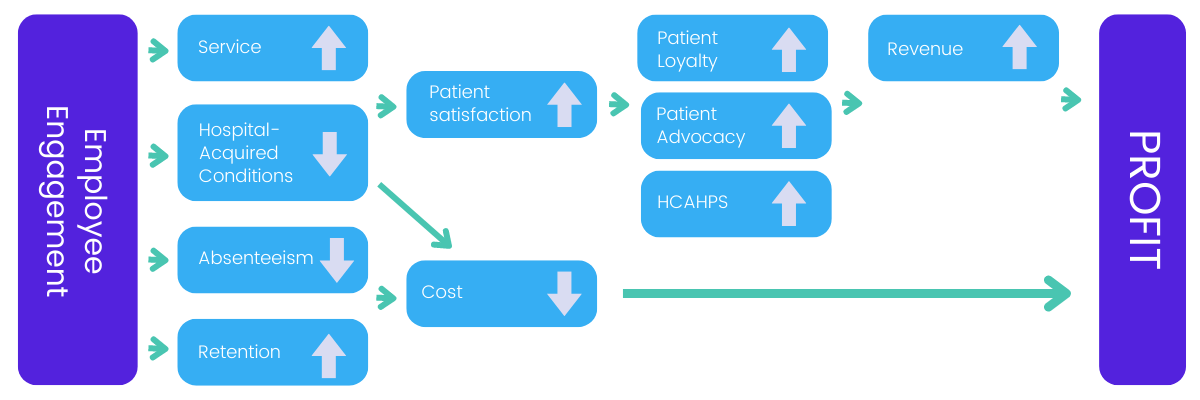4 min read
How Incident Reporting in Healthcare Improves Employee Engagement
Performance Health Partners
October 11, 2022

Utilizing a centralized incident reporting system allows healthcare organizations to enhance patient outcomes and foster a culture of care. But among the lesser obvious benefits of incident reporting in healthcare is improved employee engagement, which can result in boosted retention, decreased costs, and improved quality of care.
Increasingly, healthcare employees are being asked to do more and more with less and less. Funding cuts and significant decreases in Medicare reimbursement are growing concerns for organizations while operating costs continue to rise. Meanwhile, physicians, nurses, technicians, and other healthcare professionals are expected to provide quality care experiences that keep patient satisfaction levels high.
Adding to this pressure is industry disruption; continuously changing policies and regulations make the delivery of the patient experience challenging for professionals. Just the smallest medical error can result in an unanticipated infection or complication for a patient.
Increasing demands have led to unprecedented levels of burnout and unsurpassed turnover rates. According to recent reports, the healthcare industry has lost an estimated 20% of its workforce – including 30% of nurses – during the Great Resignation, the mass exodus of unsatisfied workers.
Healthcare workers who remain in the workforce say that staffing shortages have affected their ability to work safely and to satisfy patient needs. And with more healthcare workers planning on leaving the industry – there’s a projected shortage of more than 3 million essential health workers in the next five years – patients could face even greater risks without proactive solutions.
Employee retention is one of the healthcare industry's most crucial hurdles, not to mention one of its most expensive. If an organization with a workforce of 3,000 loses 20% of its employees, each paid an average salary of $45,000, the turnover costs would total a mammoth $27 million, according to Healthcare Finance News. This, of course, is in addition to associated hidden costs like: reduced quality of care, diminished patient safety, lost productivity, and lower staff morale.
The ROI of Employee Engagement in Healthcare
Amid this turmoil, employee engagement in healthcare has emerged as a key strategic tool to get back on the right track. Experts believe a focus on employees’ commitment and emotional investment in their work is as a vital core competency for leaders – and could be the impetus to mending today’s issues around high turnover. Data-backed benefits to placing employee engagement at the heart of workplace culture are as follows:
Increases retention
One of the clearest indicators of employee engagement is reflected in retention. In an Advisory Board engagement study, engaged employees had a turnover rate of 9.8%. Even those workers who reported being “content” (or, satisfied in their roles but not necessarily engaged) had rates of 13.4%. Conversely, disengaged employees, beat the industry average with 21.5% turnover.
Enhances employee performance
Engaged employees are 1.5 times more likely to receive top performance ratings than content employees and three times more likely to receive top performance ratings than disengaged employees.
Patient care is safer and more thorough
When healthcare employees demonstrate high engagement levels, they care about their workplace, their colleagues, and their patients. Leadership coach and Forbes contributor Kevin Kruse says this is evident in the way engaged employees uphold core tenets of patient care; they always sanitize their hands, never forget to check IV lines, and make few mistakes while administering medications.
A Gallup poll reiterates this point. Nurse engagement levels, it found, are the most significant variable correlating to mortality, even beating out the number of nurses per patient. When nurses are more engaged, patients are less likely to develop complications or infections during their stay.
Ensures employee safety
The Harvard School of Public Health found that employee engagement has a strong correlation with employee safety, thus enhancing a safer work environment. Likewise, employee engagement plays a significant role in reducing employee accidents on the job.
Improves hospital performance and reimbursement
An Advisory Board analysis showed that for every 1% increase in employee engagement, hospitals saw a 0.33-point improvement in Hospital Consumer Assessment of Healthcare Providers and Systems (HCAHPS) overall hospital rating. HCAHPS scores can affect hospitals' Medicare reimbursement by up to plus-or-minus 2% and can also influence patient decisions when choosing a provider.
While the significance of employee engagement is indisputable, what is troubling is that a 2020 Gallup study concluded that just 36% of the workforce is engaged, 45% are not engaged, and 15% are actively disengaged. In other words, nearly 64% of employees are not fully engaged. So, what can healthcare organizations do to boost employment engagement?

“Engagement Health System Profit Chain” by Kevin Kruse, CEO, LEADx and author of “Great Leaders Have No Rules”
Benefits of Incident Reporting in Healthcare: Improved Employee Engagement
True employee engagement is only possible when healthcare workers believe that their safety – and the safety of their patients – is a priority. One approach that can help achieve this is to choose employees to serve as role models and provide them with occupational health and safety training to reduce hazards (e.g., workplace violence, bullying, burn out) or operational and service process training to improve patient handling.
Healthcare organizations with high levels of employee engagement exemplify clear and open communication, boast a well-articulated purpose and mission, and have a clear commitment from leadership to create a great workplace.
But the most proactive way healthcare organizations can enhance employee engagement, says Harvard Business Review, is by encouraging employees to observe and report errors or conditions that threaten patient or staff safety through an incident reporting system.
“Without employee engagement, you’re never going to get the kind of ultimate patient experience you’re hoping for.” –Mike Packnett, CEO, Parkview Health
One of the benefits of incident reporting in healthcare is that it improves employee engagement by giving them a voice. Any employee can share observations and report an incident or a near miss. This helps to build a sense of appreciation among healthcare professionals. By having the tools needed to contribute information readily available – and by being encouraged to use them – employees feel like they matter and that they play a role in an organization’s safety culture.
This results in a blame-free environment founded on trust and transparency, as staff do not fear negative repercussions and know that any potential incident they’re involved in will be perceived as an opportunity for learning.
Interested in learning more about how incident reporting software can improve employee engagement at your healthcare organization? Request a free demo with our team.


